Introductory Remarks
A Message from Wharton Arts Executive Director Gina Caruso
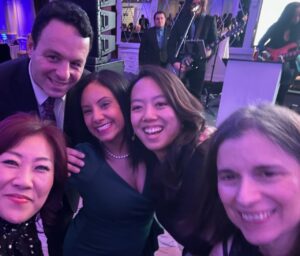
During my first three months as Executive Director, I’ve had the privilege of engaging with various stakeholders, from Board members and staff to conductors, faculty, parents, students, and alumni across all four of our programs. From attending rehearsals to witnessing performances in diverse venues throughout New Jersey, I’ve consistently been amazed by the exceptional quality of our programs.
What binds together our four Wharton Programs—the Performing Arts School, New Jersey Youth Chorus, New Jersey Youth Symphony, and Paterson Music Project—is the remarkable enthusiasm, dedication, and love that emanates from our families. One particularly poignant moment was when a mother from Paterson shared her journey of balancing two jobs while getting her daughter to her lessons and practices, while navigating multiple city buses. Her commitment was evident as she brought six family members to her daughter’s concert—a similar story has been echoed by many other families and students I’ve met. Parents frequently express how our programs instill confidence in their children and foster a sense of community. Wharton Arts is more than an arts education program for children and adults–it’s a place where the staff and faculty have created a sense of belonging.
I’ve had the pleasure of collaborating closely with our Artistic Director, Helen H. Cha-Pyo, whose infectious passion for Wharton Arts is truly inspiring. She’s not only a visionary thinker–she’s also adept at managing multifaceted programs with boundless creative energy. One evening, following a day of assisting the homeless in Paterson through our partnership with another organization, Helen accompanied me to a fundraiser. There, she effortlessly introduced me to her acquaintances, sparking lively conversations with colleagues from another non-profit arts organization. I was struck by her ability to create a warm and welcoming atmosphere for everyone, including me.
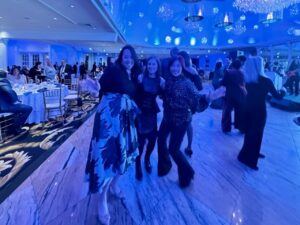
Our team’s commitment extends beyond music education; it’s about building connections and nurturing community. Patricia Joyce, Founder and Director of the New Jersey Youth Chorus, and her team, carve out time for picnics and games with the children, fostering bonds beyond the classroom. Performing Arts School Director Debra Joyal and Helen Cha-Pyo’s initiative to form a parent circle for neurodiverse children highlights our inclusive approach. Additionally, the insights shared by Joyce Alexander, our esteemed music therapist and early childhood faculty member, further underscore our commitment to holistic development.
At the recent Paterson Music Project Winter Concert, the thunderous applause for Shanna Lin, Director of PMP, from our families left me deeply moved. These stories of love and dedication are just a glimpse of the countless narratives I’ve encountered in my first three months, affirming why I feel privileged to serve at Wharton Arts.
As we celebrate Valentine’s Day, I extend my best wishes from all of us at Wharton Arts.
New Jersey Youth Symphony Spotlight
New Jersey Youth Symphony Alumna Jenise Grice
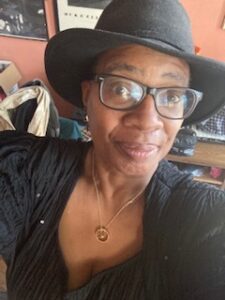
When Jenise Grice was in her junior year of high school, she became an inaugural member of NJYS in 1979, but she had been playing in orchestras since she was 11-years-old and has continued to play for the rest of her life. “ I attended Newark Arts High School in my hometown,” she said proudly. Some of the luminaries who’ve attended her alma mater, which was founded in 1931, include Sarah Vaughan, Melba Moore, jazz artists Wayne Shorter, Woody Shaw, Philadelphia Orchestra trumpeter Seymore Rosenfeld, music directors Mort Lindsey, Charlie Calello, and actor Michael B. Jordan, among others. “I’m the oldest of four siblings – two boys and two girls.” Her parents and siblings weren’t musicians but they loved music. Her siblings played instruments and sang, but she was the only one who continued to play. Grice played in orchestras in elementary school until she was eleven-years old. She was in a preparatory orchestra and advanced to the junior symphony. Frank Scocozza was the conductor and when he found out about NJYS, he wanted to get his best players to audition. She was in that group. “At the time, Bergen Youth Orchestra was the competition. Mom would schlep me to rehearsals all over the entire state. NJYS mostly served Summit, Union, and Morris counties.” She was also playing in an orchestra at the Mannes Music Prep in Manhattan, but she has extremely fond memories playing in NJYS and enjoys attending the alumni events. She joked that her stand mate said, “Wow, you’re pretty good” and she replied, “Well, I’m a professional musician and old enough to be your mother, so I better be!”
When she talks about George Marriner Maull, her eyes light up. “I loved him because he brought the joy of the music to us. He wanted us to love it as much as he did. Some conductors back then were tyrannical, but not George. He could be stern,” she said reminiscing. “He’d say something like ‘I do a lot of preparation so I expect you to do the same.’ We sincerely felt bad if we didn’t have a good rehearsal, but we always listened and respected him.” She still remembers the music he selected for them, like Háry János Suite by Kodaly. “It felt like it was the most important piece in the world because you knew you were really going to learn something and why you were playing it.”
In 1980-1981, she went to her first competition in DC. “My parents probably sold something for NJYS for me to go on that trip!” When she graduated, she attended Hartt School of Music at University of Hartford in West Hartford, Connecticut. “I had a huge advantage because I had been playing music for hours every day at Arts High School. When I took my theory classes, they thought I was a composition major.” She had taken theory classes at Newark Arts High School and later taught theory at NJYS. George Marriner Maull hired her to work at NJYS from 1988 to 1989. “At that time Michael Avagliano was the violinist, 3rd Chair, and now he’s a conductor for the Summit Symphony Orchestra!”
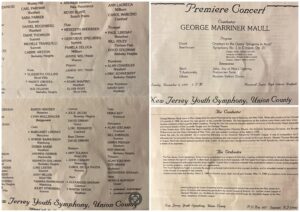
Grice performs with the Plainfield Symphony, the Somerset Symphony, and the Summit Symphony. “Sometimes I’m a ringer for Brooklyn Phil and Staten Island Phil,” she added. “I have a day job in the post office in the USPS division. My father worked for the post office and told me I should always have a steady job. I’ve been there for 39 years, but I’ve never stopped playing music.”
Grice married her soulmate Tony Reedus, a celebrated jazz musician who performed in Woody Shaw’s band with Dave Stryker, Kenny Garrett, Freddie Hubbard, and many other famous musicians. “We were married for 1 year, but I was with him for 20 years,” she said. “We understood each other.” She met him for the first time at Sweet Basil and would go hear him play music when he worked at the Village Vanguard. “It was a great time.”
Her daughter Cameron is a singer and has performed the Black National Anthem at basketball games and acted in a play for the first time in January. Grice is a close friend of Terence Blanchard when he was playing with Art Blakely and the Jazz Messengers, her favorite band. He is one of the most famous American trumpeters, pianists, and composers. “He’s composed more than 50 film and TV scores, and he’s the first Black composer to have his opera performed at the MET.”
There’s no question that Grice knows a lot of classical and jazz musicians, “I’m always happy to run into an alum from NJYS!”
Just before she ran off to take her daughter to a play rehearsal, she said, “My daughter is the one who likes to bake.” Her eyes were twinkling as she took a bite out of her bacon and cheese bun fresh from the oven at Bakehouse in New Providence.
Performing Arts School Spotlight
Performing Arts School Faculty Member Joyce Alexander
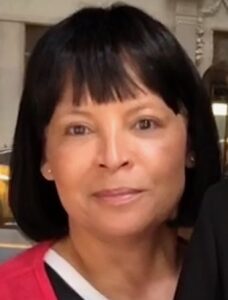
“I was born into a musical family,” said Joyce Alexander, an early childhood music teacher and music therapist at Wharton Performing Arts School. Her father, Banard Alexander, was an accomplished trumpet player in the Navy band. Alexander, the youngest of 5 siblings, was born in Guam. “My family moved wherever there was a port,” Alexander said. “We lived in Hawaii, Virginia, and Seattle. There was always music in the house!” Her father played and composed music with Quincy Jones and was even asked to join his band. Alexander said as she sipped her chai, “My father would help him arrange music, but didn’t want to take the leap to leave his family and go on the road. He didn’t want us to struggle.” She recalled when she was a toddler, she had stepped on Jones’ compositions that had fallen on the floor. “Wherever we moved, my mother always had a piano in the house. We were like the Waltons. Do you remember that TV show? My whole family would sing together on Sunday.”
Then, when she was 5, her father passed away and her mother moved the family to Williamsburg, Brooklyn where she went to Brooklyn Technical High School. “We lived in a building where we were the only non-Hasidic Jewish family. I was friends with some girls who lived in the building, but I couldn’t play with them after their fathers came home. And after they turned 13, I wasn’t allowed to play with them anymore. That’s when I learned about the world,” she said sadly.
After she graduated from high school, she attended State University at Buffalo to study architecture and Interior design. “After a year and a half, I was miserable and told my mother I would work instead.” She got an apartment in Queens and an entry level job working for Texas Instruments, and decided to take music classes for enjoyment.
She took piano and vocal lessons, German, Portuguese, and Japanese because she loves languages. A friend took her out to hear music and introduced her to a guitarist who was a music therapist. Intrigued, she asked him what she would need to do to go into his field. “I was musically inclined, but I didn’t want to perform.” When she was 28, she was accepted into a 5-year music therapy program at Montclair State University. “My courses were 50% psychology and 50% music education– it was intimidating, but I’ve never regretted it.” She excelled in the program and worked as a student teacher with children who had been emotionally and psychologically abused.
She worked as a music therapist in a public school with children who had special needs before she made the transition to Wharton Arts. Some of the students she’s worked with are hearing impaired, blind, or are on the autism spectrum. “I meet them where they are,” Alexander said. “I always make music enjoyable for the children. I don’t overwhelm them with different therapies. My goal is to first make music relaxing for them, and then I focus on social-emotional strategies.” She lets parents know that it’s important to build trust with the children. “I follow their lead. I start with their strengths. If teachers do that, there’s no need to reprimand them. Humor and joking are helpful.” The children at Wharton Arts are always delighted to see her and run into her classroom eager to play music and talk with her about their week.
Early in her career, a professor recommended her for a position as a music therapist at the Suburban Community Music Center in New Providence, which later became Wharton Arts. Ms. Lipton, who was the Executive Director, hired her on the spot. Currently, Alexander works 4 days a week at Cedar Hill Preparatory School and teaches general music and chorus. Her son, Conor Hampton, began piano lessons at Wharton Arts at age 7 and then transitioned to flute lessons when he was 11-years-old. He became a member of NJYS on flute when he was 16-years-old. He currently attends Northeastern University in Boston and is majoring in civil engineering and computer science. He also plays the flute in the university’s orchestra.
Alexander met her husband, Brian Hampton, when they were working with children with special needs. “He was the lead teacher, so we couldn’t date then,” she smiled. They started dating after she left and they’ve been married for 23 years. “If I had to go back to school, I would become a musicologist. I love languages, history, and music from around the world. I’m always drawn to new things!”
Paterson Music Project Spotlight
Paterson Music Project Founding Teacher and Former Director Elizabeth Moulthrop
Q & A with Elizabeth Moulthrop, Executive Director of El Sistema USA
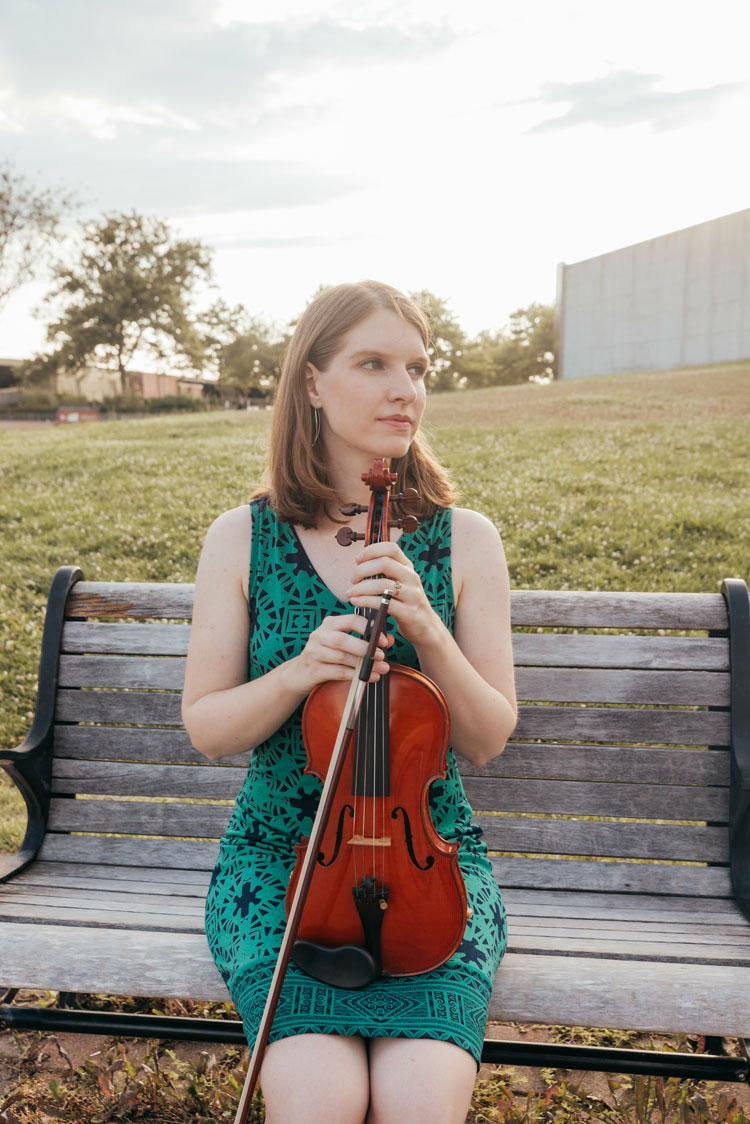
Q: You began your own non-profit in Peru when you were a college student. What was the mission and name of this non-profit and what motivated and inspired you to do this?
A: The nonprofit is called Notes for Change, Inc. The mission was to use music as a vehicle for social impact for children. Through Notes for Change, I ran the Pisco Music Program in Pisco, Peru for three consecutive summers. I was inspired to begin this project because I had visited Peru with my church to provide aid in the wake of a devastating earthquake in 2008 and found my violin to be a relevant tool on the trip. I returned many times to specifically teach music and the project grew from there.
Q: Your mom helped you start a 501-c3. How did she help you to do this?
A: She is an accountant and helped me navigate what forms I had to file to incorporate and to get our EIN.
Q: Who encouraged you to begin an El Sistema program in Paterson, NJ? Who was on your team and how did you convince them to join you?
A: At the time, the Artistic Director of the New Jersey Youth Symphony (NJYS), a program of the Wharton Institute for the Performing Arts, was Jeffrey Grogan. He had the vision of starting an El Sistema program under the same umbrella. Wharton had been in touch with the Dodge Foundation and secured funding to begin a program in Paterson, which was a community with great need and little public arts funding. Music and arts are state mandated in NJ, but 21,000 students in 2011 didn’t have music or art classes in their schools across the state. 14,000 of those students (or two thirds) were concentrated in Paterson. The city had severe budget cuts, which caused them to remove the majority of the art and music teacher positions. Therefore, a program like Paterson Music Project could provide a much-needed service. Jeff Grogan hired me, Terrence Thornhill, and Shanna Lin to begin the program in January 2013. Terrence, Shanna, and I were all roommates at the time. Terrence and I met in high school and played in orchestra together there. Shanna and I were college roommates and played in a string quartet together. There was very little convincing – we were all excited and energized by the project.
Q: Your original team (your roommates from college) is now leading the Paterson Music Project. Can you briefly share how this happened and what your roles were in the beginning?
A: I was the program coordinator initially and taught violin. Shanna taught viola. Terrence taught cello. Over the years the roles grew and I became the Director full time. Shanna also became full time and eventually we divided the leadership roles between administration and education. I did more budgets, partnership building, and fundraising. Shanna focused on programming, curriculum, and teacher development.
Q: What makes this program successful and how does it make a difference in the lives of the children it serves?
A: The program had several ingredients that made it so successful. First, the leadership was incredibly dedicated, and we gave our hours and energy above and beyond what was asked of us because we enjoyed it so much. We were green and made a lot of mistakes but were eager to learn and evolve. Between Terrence, Shanna, and me – our skills were complimentary. Terrence has an ability to connect with kids and foster intrinsic motivation in his students. Shanna is a detail-oriented teacher and leader. The parents and students were also a big factor. There was lots of interest in this program and many of the families demonstrated a strong commitment to the program year after year. Ultimately, it was the relationships between the staff and families that has made the program so strong. Finally, we were successful on a large scale because early on we were able to partner with the Paterson public schools who provided a significant percentage of the funding required to run the program, which allowed us to grow in numbers and quality.
Q: Paterson Music Project was established over a decade ago and then became part of Wharton Arts. When and why did this happen and how has the program grown and strengthened since then?
A: Paterson Music Project was established in 2013 after NJYS and Wharton Music Center (now Wharton Arts) had merged. It was always part of the organization, but the name of the organization was not yet Wharton Arts.
Q: El Sistema first began in Venezuela. Were you aware of this program when you started your non-profit in Peru?
A: Yes, I had watched a documentary about El Sistema around the same time I went to Peru for the first time. I was also aware of the Abreu Fellowship through the New England Conservatory which was a program that developed leaders to establish El Sistema programs in the Unites States.
Q: Paterson Music Program has many partnerships and ties to the community? How did you and your team make this happen?
A: Our biggest partnership is with the Paterson Public Schools, which we were able to develop through the staff at the Community Charter School of Paterson, where the program had started, and they connected us with School Board members and district leadership. We demonstrated the success of the model at CCSP and secured funding in our second year to open a site at Public School 1. From there, it grew. The students performed frequently in public at events, so people began to know who we were. We performed at events for the Rotary Club, Police Benevolent Society, school board meetings, ribbon cuttings, festivals, nonprofit galas…you name it!
Q: How did you forge an alliance with the Mayor of Paterson, and other community leaders in Paterson? Why are these relationships critical to the success of any community program?
A: These connections are critical because the program belongs to the community of Paterson, which includes the people who run and make up the city—the mayor, the school board, the parents, the business owners, the nonprofits, etc. We are part of a tapestry of advocates for children and families. It’s crucial to be connected to the life of the city and to see how we can contribute.
Q: How many El Sistema programs are there in NJ alone? How many are in the U.S. and in the world?
A: There are 5 programs in NJ (Keys to Success, United Children’s Music Project, Paterson Music Project, Trenton Music Makers, and Sister Cities Voices). El Sistema USA has 140 members across the US and Canada. There are more programs though—not all are members. I don’t know how many in the world.
Q: You are now the Executive Director of all the El Sistema Projects in the U.S. This is incredibly impressive and a testament to all the work you did while you were Director of the Paterson Music Project. What are your most important goals, dreams, and hopes for the organization and all the El Sistema programs throughout the Unites States?
A: I hope that El Sistema programs continue to thrive and grow. This requires the programs to have sustainable funding and support. I believe that the El Sistema model in the US is a deeply impactful model. This includes accessible/affordable programming, deep investment in students over time through high quality instruction, and community formation through frequent ensemble instruction. Our programs have been on the forefront of thinking about equitable programming, youth voice, and culturally relevant pedagogy for over a decade. I’d like to see those lessons learned and best practices developed to be shared among our programs and with the larger music education world. I also hope to see the first waves of graduates from these programs going into careers both in and out of the music field. The students who graduate from El Sistema programs have had unique experiences, having been in their programs for sometimes a decade or more, they had the same mentors and peers in music for years, performed frequently, traveled because of music, and had leadership roles from a young age. It is exciting to see the mark they will leave on our field and the world. My dream is that we pass the baton to the alumni of these programs to see where they want to take it.
New Jersey Youth Chorus Spotlight
Wharton Arts Board Member and NJYC Parent Erika Fanelle
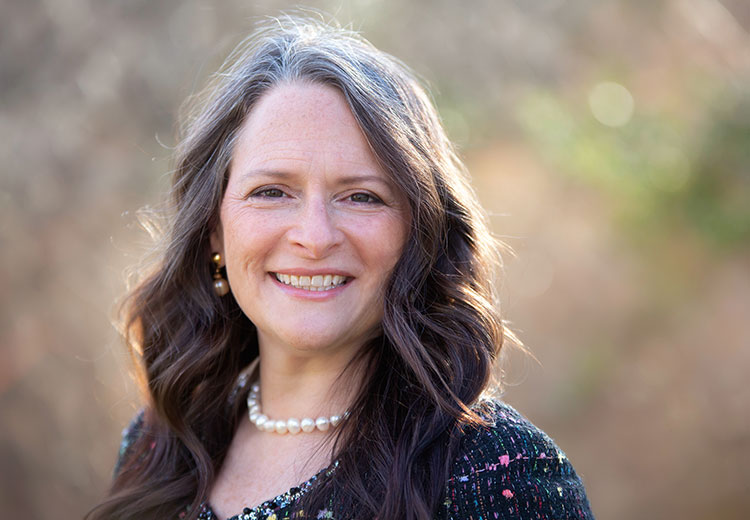
Erika Fanelle is the newest member of Wharton Board of Trustees. She received her MBA from Columbia Business School, a BAS from the School of Engineering and Applied Science at University of Pennsylvania, and a BS in Economics at the Wharton School of Business. Her professional experience includes management consulting, strategic planning, new business development, and organizational development.
Erika is the parent of two New Jersey Youth Chorus alumnae: Lilly Fanelle, ’23, and Sophia Fanelle, ’19. Since 2010, she has been an active NJYC Volunteer, serving on the 25th and 30th Anniversary Gala Host and Planning committees, and the organizing committees for several Chocolate Festival Fundraisers. Erika’s favorite NJYC volunteer experiences were chaperoning trips and concerts, including the White House, Carnegie Hall, Kennedy Center, Rome, Hungary/Austria, and Wales trips, and many spring and winter concerts.
Erika has also been an active volunteer leader in various community organizations, including Milburn Short Hills Action Network, the Girl Scouts, New Jersey SEEDS, Kent Place School, and Far Brook School.
Erika says she is looking forward to working with the Wharton Arts Board of Trustees and being part of the broader Wharton Arts community. “Music education was a formative part of my daughters’ childhoods. Playing and singing together remains our family’s joy. I am excited to be helping steward Wharton Arts in its mission to offer an accessible, high quality performing arts education that sparks personal growth and builds inclusive communities.”